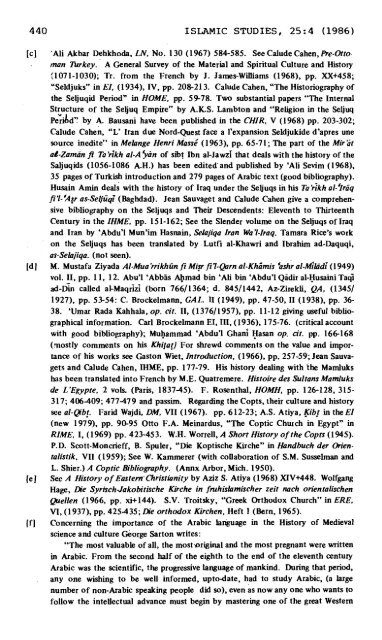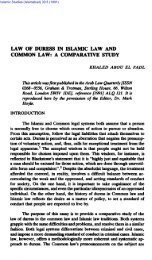ISLAMIC & WESTERN HISTORIOGRAPHY
ISLAMIC & WESTERN HISTORIOGRAPHY
ISLAMIC & WESTERN HISTORIOGRAPHY
Create successful ePaper yourself
Turn your PDF publications into a flip-book with our unique Google optimized e-Paper software.
440 <strong>ISLAMIC</strong> STUDIES, 25:4 (1986)<br />
[c] 'Ali Akbar Dehkhoda. LN. No. 130 (1967) 584-585. See Calude Cahen. he-Otto<br />
man Zhrkey. A General Survey of the Material and Spiritual Culture and History<br />
;1071-1030); Tr. from the French by J. James-Williams (1968). pp. XX+458;<br />
"Seldjuks" in EI, (1934), IV, pp. 208-21 3. Calude Cahen, "The Historiography of<br />
the Seljuqid Period" in HOME, pp. 59-78. Two substantial papers "The Internal<br />
Sttucture of the Seljuq Empire" by A.KS. Lambton and "Religion in the Seljuq<br />
~eribd" by A. Bausani have been published in the CHIR, V (1968) pp. 203-302;<br />
Calude Cahen, "L' Iran due Nord-Quest face a l'expansion Seldjukide d'apres une<br />
source inedite" in Melange Henri Mass; (1 963). pp. 65-7 1 ; The part of the Mir 5t<br />
a&Zamin fi Ta 'rikh al-A $an of sib! Ibn al-Jawzi that deals with the history of the<br />
Saljuqids (1056-1086 A.H.) has been edited and published by 'Ali Sevim (1968).<br />
35 pages of Turkish introduction and 279 pages of Arabic text (good bibliography).<br />
Husain Amin deals with the history of Iraq under the Seljuqs in his To 'rikh al-'Iriq<br />
fi'l-'Ac as-SeQUqi (Baghdad). Jean Sauvaget and Calude Cahen give a comprehensive<br />
bibliography on the Seljuqs and Their Descendents: Eleventh to Thirteenth<br />
Century in the IHME, pp. 151-162; See the Slender volume on the Seljuqs of Iraq<br />
and Iran by 'Abdu'l Mun'im Hasnain, Selajiqa Iran Wa 7-Iraq. Tamara Rice's work<br />
on the Seljuqs has been translated by Lutfi al-Khawri and Ibrahim ad-Daquqi.<br />
as-Selajiqa. (not seen).<br />
[dl M. Mustafa Ziyada Al-Mua'rrikhiin fi Miy fi7-phm al-Khimis %shr al-~hidi (1949)<br />
vol. 11, pp. 1 1. 12. Abu'l 'Abbis emad bin 'Ali bin 'Abdu'l Qidir al-Husaini Taqi<br />
ad-& called al-Maqd (born 76611364; d. 84511442. Az-Zirekli. QA, (13451<br />
1927). pp. 53-54: C. Brockelmann, GAL. I1 (1949), pp. 47-50, I1 (1938). pp. 36-<br />
38. 'Umar Rada Kahhala. op. cit. 11. (1 37611 957). pp. 11-1 2 giving useful bibliographical<br />
information. Carl Brockelmann EI. 111, (1936). 175-76. (critical account<br />
with good bibliography); Muhammad 'Abdu'l Ghan'l Hasan op. cit. pp. 166-168<br />
(mostly comments on his Khifa!) For shrewd comments on the value and importance<br />
of his works see Gaston Wiet. Introduction, (1966). pp. 257-59; Jean Sauvagets<br />
and Calude Cahen, IHME. pp. 177-79. His history dealing with 'the Marnluks<br />
has been translated into French by M.E. Quatremere. Histoire des Sultans Mamluks<br />
de L'Egypte, 2 vols. (Paris, 183745). F. Rosenthal. HOMH, pp. 126-128, 315-<br />
317; 406409; 477479 and passim. Regarding the Copts. their culture and history<br />
see al-@b!. Farid Wajdi. DM, VII (1967). pp. 612-23; AS. Atiya. Fib! in the EI<br />
(new 1979). pp. 90.95 Otto F.A. Meinardus. "The Coptic Church in Egypt" in<br />
RIME. I. (1 969) pp. 423-45 3. W.H. Worrell. A Short History of the Copts (1 945).<br />
P.D. Scott-Moncrieff. B. Spuler. "Die Koptische Kirche" in Handbuch der (hientalistik.<br />
VII (1959); See W. Kammerer (with collaboration of S.M. Susselman and<br />
L. Shier.) A Coptic Bibliography. (Annx Arbor. Mich. 1950).<br />
[el See A History of Eastern Christianity by Aziz S. Atiya (1968) XIV+448. Wolfgang<br />
Hag. Die SyrischJakobitische Kirche in fmhislamischer zeit mch orientalischen<br />
Quellen (1966, pp. xi+144). S.V. Troitsky, "Greek Orthodox Church" in ERE.<br />
V1, (1937), pp. 425435; Die orthodox Kirchen, Heft 1 (Bern, 1965).<br />
[f] Concerning the importance of the Arabic language in the History of Medieval<br />
science and culture George Sarton writes:<br />
"The most valuable of all, the mostariginal and the most pregnant were written<br />
in Arabic. From the second half of the eighth to the end of the eleventh century<br />
Arabic was the scientific, the progressive language of mankind. During that period,<br />
any one wishing to be well informed, uptodate, had to study Arabic. (a large<br />
number of non-Arabic speaking people did so), even as now any one who wants to<br />
follow the intellectual advance must begin by mastering one of the great Western
















